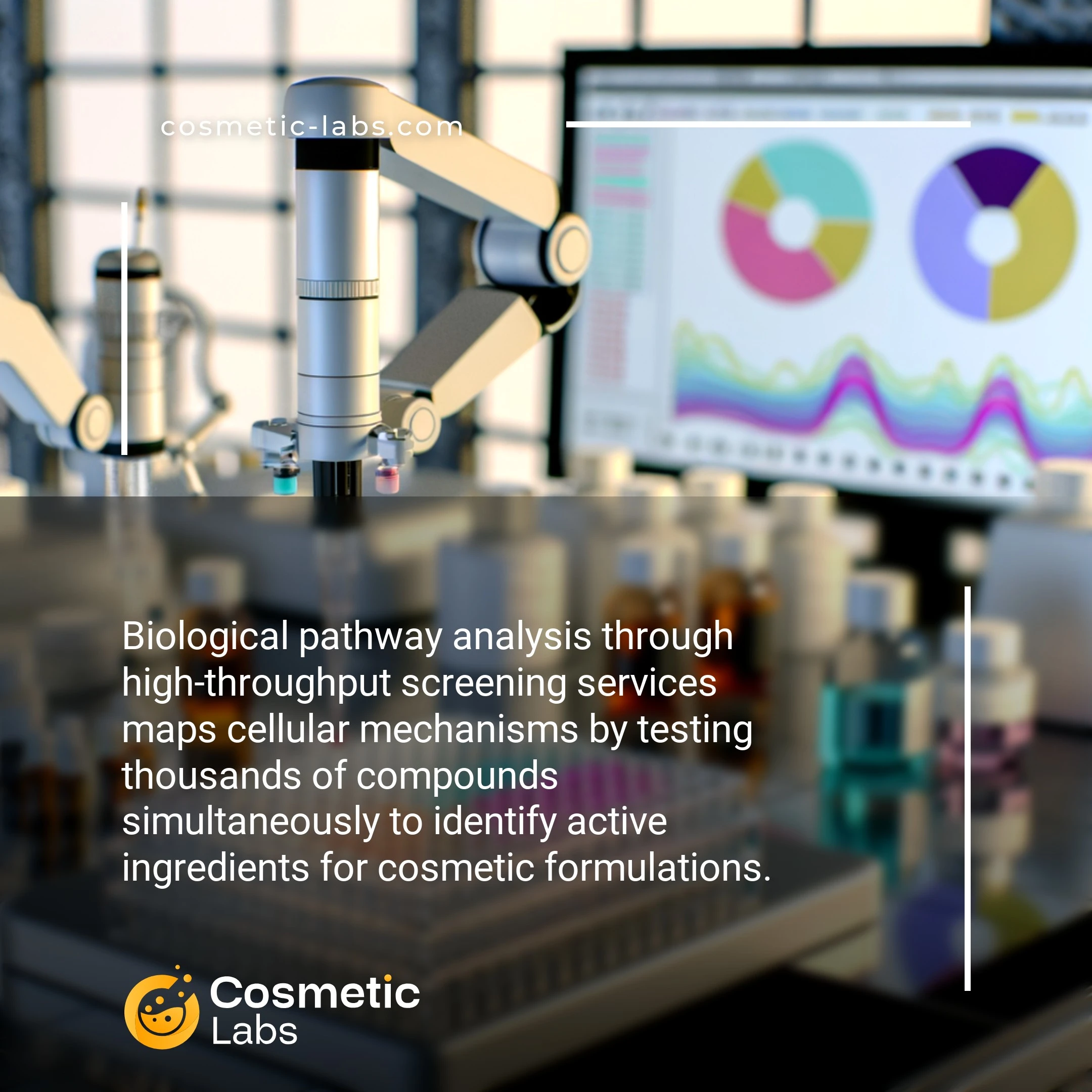Biological Pathway Analysis Services for Beauty Product Development

What is Biological pathway analysis through high-throughput screening?
Biological pathway analysis through high-throughput screening services maps how active ingredients interact with cellular processes to produce skin benefits. Our partner labs use automated testing systems to examine thousands of compounds simultaneously, tracking their effects on collagen synthesis, melanin production, and inflammatory responses. This approach reveals which ingredients work together synergistically and identifies potential irritants before formulation, helping you develop safer, more effective products with scientific backing.
Why do you need this service?
Cosmetic labs use biological pathway screening to identify active ingredients that target specific skin concerns like collagen production, melanin synthesis, or inflammation pathways. This approach helps brands discover scientifically-backed compounds for anti-aging serums, brightening treatments, and sensitive skin formulations by testing thousands of potential actives against cellular targets in weeks rather than months.
Who provides Biological pathway analysis through high-throughput screening services?
All cosmetic labs providing Biological pathway analysis through high-throughput screening services
There is no company providing these services at the moment.
Biological Pathway Analysis Through High-Throughput Screening Services
Biological pathway analysis reveals how active ingredients interact with cellular processes in skin tissue. Labs use automated screening platforms to test thousands of compounds simultaneously, identifying which formulations trigger specific anti-aging, hydration, or protective responses.
Cellular Response Mapping
Modern screening systems track how ingredients influence gene expression, protein synthesis, and metabolic pathways. Labs run parallel assays on skin cell cultures, measuring responses like collagen production, melanin synthesis, and inflammatory markers. This data shows exactly which compounds deliver the benefits you’re targeting.
Key pathway targets include:
- Collagen and elastin synthesis pathways
- Antioxidant enzyme activation
- Barrier function proteins
- UV damage repair mechanisms
Efficacy Validation and Optimization
Screening services validate ingredient combinations by testing dose-response relationships across multiple biological targets. Labs identify optimal concentrations where pathways activate without triggering adverse reactions. This approach eliminates guesswork in formulation development.
Testing protocols examine synergistic effects between ingredients, revealing combinations that enhance pathway activation. Labs also screen for potential interactions that could reduce efficacy or cause irritation. The result is data-driven formulation decisions that maximize product performance.
Connect with specialized labs on our platform to access pathway analysis services tailored to your specific product goals and target market requirements.
Practical Applications of Biological Pathway Analysis Through High-Throughput Screening
Cosmetic labs use biological pathway analysis through high-throughput screening services to identify active ingredients, validate claims, and optimize formulations across multiple product categories.
Anti-Aging Ingredient Discovery and Validation
Labs screen thousands of compounds against collagen synthesis pathways, elastin production networks, and cellular repair mechanisms. This approach identifies ingredients that target specific aging processes at the molecular level. Teams analyze pathway responses within 48-72 hours using automated screening platforms.
The process reveals how compounds affect key proteins like MMP-1, TIMP-1, and procollagen type I. Labs test concentrations from 0.1% to 5% to establish dose-response relationships for regulatory submissions. Results guide formulation teams toward ingredients with proven pathway activity rather than traditional trial-and-error methods.
Skin Barrier Function and Sensitivity Testing
High-throughput screening evaluates inflammatory pathways, ceramide synthesis routes, and barrier protein expression patterns. Labs process 96-well plates containing different formulation combinations to assess skin compatibility. This method identifies potential irritants before clinical testing phases.
Pathway analysis reveals how ingredients interact with NF-κB signaling, cytokine release cascades, and tight junction proteins. Labs measure biomarkers like IL-1α, IL-8, and filaggrin expression levels. Results appear within 24-48 hours, accelerating product development timelines by 3-6 months compared to traditional patch testing alone.
| Screening Application | Target Pathways | Turnaround Time | Sample Volume |
|---|---|---|---|
| Anti-aging efficacy | Collagen synthesis, MMP inhibition | 48-72 hours | 10-50 μL |
| Skin barrier protection | Ceramide production, inflammation | 24-48 hours | 5-25 μL |
| Pigmentation control | Melanogenesis, tyrosinase activity | 72-96 hours | 15-40 μL |
| Antioxidant activity | ROS scavenging, Nrf2 activation | 12-24 hours | 5-20 μL |
Ready to accelerate your ingredient discovery process? Connect with specialized cosmetic labs on our platform that offer biological pathway analysis and high-throughput screening services tailored to your product development needs.
